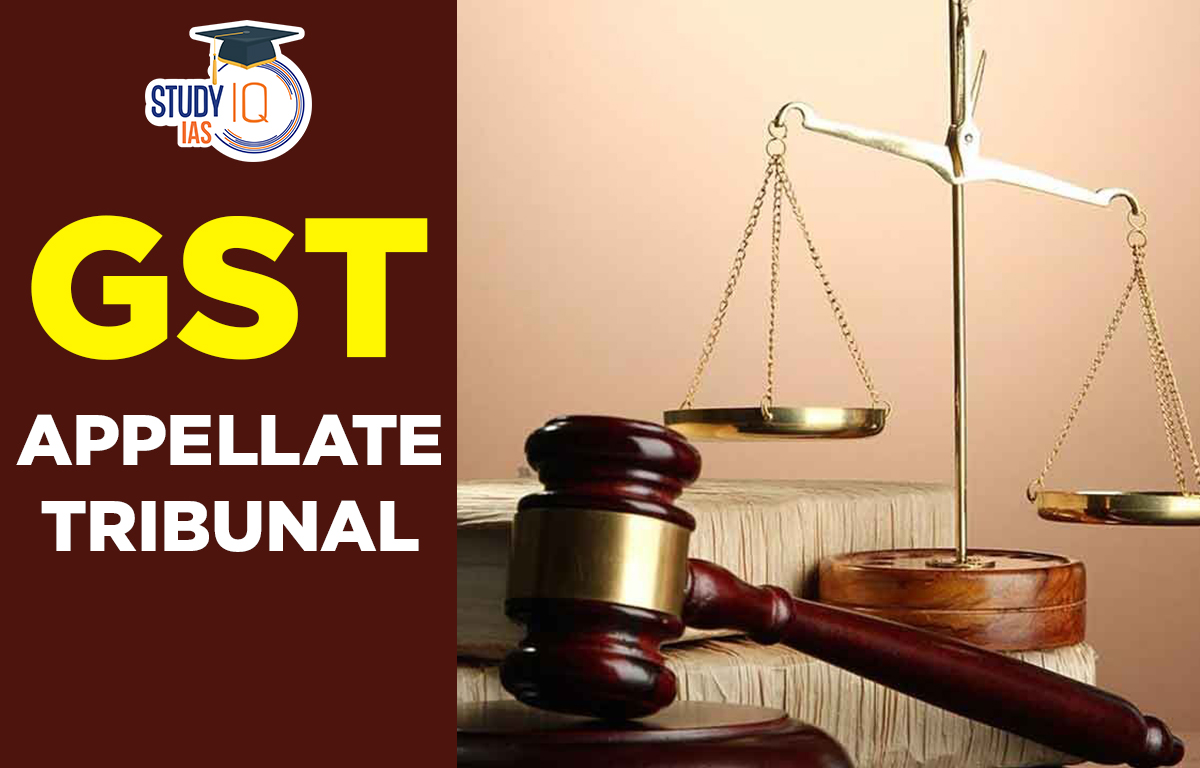Table of Contents
Context: The Goods and Services Tax (GST) Council, in its 49th meeting, has approved the creation GST Appellate Tribunal.
Creation of GST Appellate Tribunal (GSTAT)
- Approval: The setting of an appellate tribunal mechanism paves the way for dispute redressal on a national and state-level basis for the first time after the GST rollout in July 2017.
- A Group of Ministers [GoM] was constituted in 2022 to recommend changes required in the GST law pertaining to the set-up of the Tribunal.
- The GoM reports have been accepted with slight modifications.
- Benches: The GST Tribunal will have one principal bench in New Delhi and as many benches or boards in States as decided by each State, subject to approval of the Council.
- Members: The bench shall have two judicial members and two technical members, with a senior judicial member of the State High Court in the selection panel.
- For a particular State bench, all judicial and technical members will be from that State.
- Importance: The establishment of GSTAT is expected to bring relief to businesses that have long awaited a quick and efficient process for resolving GST disputes.
- Robust Judicial Mechanism: An appropriate appellate structure in the form of Tribunal will provide an effective and speedy resolution of disputes thereby lowering the judiciary’s burden.
- Uniformity: The expeditious constitution of GSTAT is expected to guarantee uniformity pan India and faster redress of grievances.
- Ease of Doing Business: It will also facilitate the “ease of doing business” and further make the country a lucrative destination for trade.
- Business Friendly: The creation of a GST Appellate Tribunal to handle GST-related issues will signal to the world that India is working and taking steps to make the country more business-friendly and a preferred destination for trade and commerce.
- Citizen Centric: GST was designed by the Union Government to make taxation simple for citizens to comply under the singular goal of One Nation, One Tax.
- The establishment of this Tribunal further aims to institutionalise government’s citizen-centric approach on the subject.
- Reduce Conflicts: It will assist both the Union and the State Governments, reducing conflicts between them and ensuring uniformity in dispute resolution.
- Economical: The tribunals are more adaptable than regular courts; they provide justice more quickly and are economical.
- The fact that tribunal’s procedures are simple enough for a layperson to understand makes them one of the most popular Alternative Dispute Resolution (ADR) options.
Need for GST Appellate Tribunal
- Interpretational Challenges: Since the introduction of GST in July 2017, GST law has been subjected to divergent interpretations by the taxpayers as well as the authorities.
- It led to numerous disputes mainly in the context of the levy, valuation, classification, creditability (including transitional credits), and refunds.
- Lack of Specialized Benches: In the absence of GST Appellate Tribunals, taxpayers have often been invoking writ jurisdiction to seek relief from High Courts.
- Without an ultimate fact-finding authority in the form of GTAT in place, knocking on the doors of High Courts is not viable.
- Also, these High Courts may not have specialized Benches to deal with GST matters, or simply cannot accommodate the matters on the Board expeditiously, due to the pending backlog.
- Judicial Pendency: Given the pendency of matters, the constitution of the GST Appellate Tribunal (GSTAT) has been much awaited in recent years for judicious disposal of cases.
- Difficulties Faced by Aggrieved Taxpayers: In the absence of Tribunal, the aggrieved taxpayer has no option but to wait for justice, while the revenue authorities press aggressively for implementation of their own orders.
What is the GST Council?
- Formation: The Goods and Services Tax regime came into force after the Constitutional (122nd Amendment) Bill was passed by both Houses of Parliament in 2016.
- More than 15 Indian States then ratified it in their State Assemblies, after which the President gave his assent.
- Constitutional Provision: The GST Council – a joint forum of the Centre and the States — was set up by the President as per Article 279A (1) of the amended Constitution.
- Members: The members of the Council include the Union Finance Minister (chairperson), the Union Minister of State (Finance) from the Centre.
- Each State can nominate a minister in-charge of finance or taxation or any other minister as a member.
- Functions: Following are the key functions of the GST Council:
- As per Article 279A (4), the Council will make recommendations to the Union and the States on important issues related to GST, like the goods and services that may be subjected or exempted from GST, model GST Laws.
- Principles that govern Place of Supply, threshold limits, GST rates including the floor rates with bands,
- Special rates for raising additional resources during natural calamities/disasters, special provisions for certain States, etc.
- Power to Legislate: According to the Supreme Court, Article 246A of the Indian Constitution gives both Parliament and State Legislatures “simultaneous” power to legislate on GST.
- It also said that recommendations of the Council “are the product of a collaborative dialogue involving the Union and States”.



 How African Reserves Eliminated Rhino Po...
How African Reserves Eliminated Rhino Po...
 Why India Needs Its Own Economic Model?
Why India Needs Its Own Economic Model?
 Challenges in India’s Airline Sector: ...
Challenges in India’s Airline Sector: ...

























